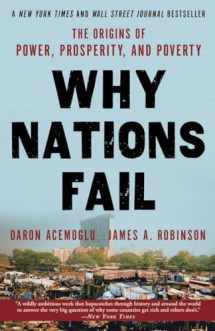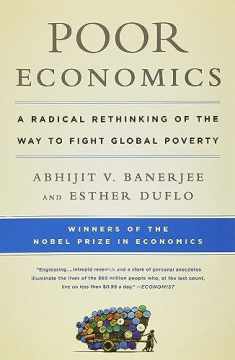
Why Nations Fail: The Origins of Power, Prosperity, and Poverty
ISBN-13:
9780307719225
ISBN-10:
0307719227
Edition:
Reprint
Author:
Daron Acemoglu, James A. Robinson
Publication date:
2013
Publisher:
Crown Currency
Format:
Paperback
544 pages
FREE US shipping
on ALL non-marketplace orders
Marketplace
from $17.13
USD
Marketplace offers
Seller
Condition
Note
Seller
Condition
New
Brand New! Not overstocks! Brand New direct from the publisher! Ships in sturdy cardboard packaging.
Book details
ISBN-13:
9780307719225
ISBN-10:
0307719227
Edition:
Reprint
Author:
Daron Acemoglu, James A. Robinson
Publication date:
2013
Publisher:
Crown Currency
Format:
Paperback
544 pages
Summary
Why Nations Fail: The Origins of Power, Prosperity, and Poverty (ISBN-13: 9780307719225 and ISBN-10: 0307719227), written by authors
Daron Acemoglu, James A. Robinson, was published by Crown Currency in 2013.
With an overall rating of 5.0 stars, it's a notable title among other
Development & Growth
(Economics, Economic Conditions, Economic History, Economic Policy & Development, Theory, International Business, Non-US Legal Systems, Legal Theory & Systems) books. You can easily purchase or rent Why Nations Fail: The Origins of Power, Prosperity, and Poverty (Paperback) from BooksRun,
along with many other new and used
Development & Growth
books
and textbooks.
And, if you're looking to sell your copy, our current buyback offer is $1.25.
Description
Brilliant and engagingly written, Why Nations Fail answers the question that has stumped the experts for centuries: Why are some nations rich and others poor, divided by wealth and poverty, health and sickness, food and famine?
Is it culture, the weather, geography? Perhaps ignorance of what the right policies are?
Simply, no. None of these factors is either definitive or destiny. Otherwise, how to explain why Botswana has become one of the fastest growing countries in the world, while other African nations, such as Zimbabwe, the Congo, and Sierra Leone, are mired in poverty and violence?
Daron Acemoglu and James Robinson conclusively show that it is man-made political and economic institutions that underlie economic success (or lack of it). Korea, to take just one of their fascinating examples, is a remarkably homogeneous nation, yet the people of North Korea are among the poorest on earth while their brothers and sisters in South Korea are among the richest. The south forged a society that created incentives, rewarded innovation, and allowed everyone to participate in economic opportunities.
The economic success thus spurred was sustained because the government became accountable and responsive to citizens and the great mass of people. Sadly, the people of the north have endured decades of famine, political repression, and very different economic institutions—with no end in sight. The differences between the Koreas is due to the politics that created these completely different institutional trajectories.
Based on fifteen years of original research Acemoglu and Robinson marshall extraordinary historical evidence from the Roman Empire, the Mayan city-states, medieval Venice, the Soviet Union, Latin America, England, Europe, the United States, and Africa to build a new theory of political economy with great relevance for the big questions of today, including:
- China has built an authoritarian growth machine. Will it continue to grow at such high speed and overwhelm the West?
- Are America’s best days behind it? Are we moving from a virtuous circle in which efforts by elites to aggrandize power are resisted to a vicious one that enriches and empowers a small minority?
- What is the most effective way to help move billions of people from the rut of poverty to prosperity? More philanthropy from the wealthy nations of the West? Or learning the hard-won lessons of Acemoglu and Robinson’s breakthrough ideas on the interplay between inclusive political and economic institutions?
Why Nations Fail will change the way you look at—and understand—the world.
Is it culture, the weather, geography? Perhaps ignorance of what the right policies are?
Simply, no. None of these factors is either definitive or destiny. Otherwise, how to explain why Botswana has become one of the fastest growing countries in the world, while other African nations, such as Zimbabwe, the Congo, and Sierra Leone, are mired in poverty and violence?
Daron Acemoglu and James Robinson conclusively show that it is man-made political and economic institutions that underlie economic success (or lack of it). Korea, to take just one of their fascinating examples, is a remarkably homogeneous nation, yet the people of North Korea are among the poorest on earth while their brothers and sisters in South Korea are among the richest. The south forged a society that created incentives, rewarded innovation, and allowed everyone to participate in economic opportunities.
The economic success thus spurred was sustained because the government became accountable and responsive to citizens and the great mass of people. Sadly, the people of the north have endured decades of famine, political repression, and very different economic institutions—with no end in sight. The differences between the Koreas is due to the politics that created these completely different institutional trajectories.
Based on fifteen years of original research Acemoglu and Robinson marshall extraordinary historical evidence from the Roman Empire, the Mayan city-states, medieval Venice, the Soviet Union, Latin America, England, Europe, the United States, and Africa to build a new theory of political economy with great relevance for the big questions of today, including:
- China has built an authoritarian growth machine. Will it continue to grow at such high speed and overwhelm the West?
- Are America’s best days behind it? Are we moving from a virtuous circle in which efforts by elites to aggrandize power are resisted to a vicious one that enriches and empowers a small minority?
- What is the most effective way to help move billions of people from the rut of poverty to prosperity? More philanthropy from the wealthy nations of the West? Or learning the hard-won lessons of Acemoglu and Robinson’s breakthrough ideas on the interplay between inclusive political and economic institutions?
Why Nations Fail will change the way you look at—and understand—the world.
Reader reviews


We would LOVE it if you could help us and other readers by reviewing the book
1 - 1 of 1 reviews
Verified Buyer
Nov 20, 2023
This book is a must–read for anyone who wants to understand better the political and economic development of Nations. The theoretical framework the authors offer is rather simple but not at all simplistic, it is powerful in its ability to explain why some nations move ahead in their development while others lag behind. They back up their ideas by Fascinating deep dives into the history of many countries around the world. If this subject is of interest to you, BUY THIS BOOK!
Book review

Congratulations! We have received your book review.
{user}
{createdAt}
by {truncated_author}



